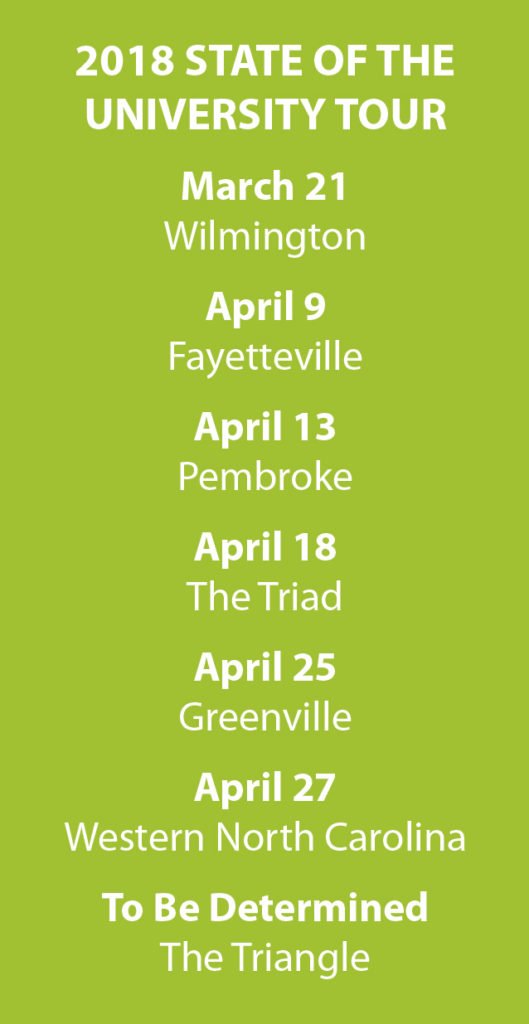 CHARLOTTE – North Carolina has built one of the finest university systems in the nation, University of North Carolina System President Margaret Spellings said Monday.
CHARLOTTE – North Carolina has built one of the finest university systems in the nation, University of North Carolina System President Margaret Spellings said Monday.
But it can be better.
“As I like to say, we’re pleased but not satisfied,” Spellings told an audience at UNC Charlotte in the first of a series of State of the University addresses across the state.
The UNC System has raised its graduation rate more than 6% in the past five years, leading to 2,000 more students with a degree this year, she said. It has increased research funding by $300 million – to $1.5 billion – since 2012. It produces 21,000 graduates a year in health and STEM fields. It enrolls nearly 20% more Pell-eligible students than it did in 2011.
But Spellings outlined three challenges the University must address to improve:
Economic Mobility
“Higher education is a proven route to upward mobility,” she said.
“A student from a family in the bottom income quintile who enrolls at UNC Charlotte is nearly six times more likely to reach the top income quintile life than a student who doesn’t pursue higher education. When we meet our core mission – reaching talented students from all backgrounds, getting them in the door, helping them graduate – college changes lives, lifts families, and transforms communities.”
She noted that 40% of North Carolina college students are 22 or older, many already working or with families to support. Another 36% take courses online. And 46% are in two-year programs.
“We must welcome and support alternative paths to opportunity,” she said. “…Any vision that’s overly focused on providing four-year degrees to 18-year-olds fresh out of high school won’t cut it anymore. The world has changed.”
Even if educators create those paths, she said, “Options don’t mean much if you can’t afford them.”
She noted that the General Assembly has ordered fixed tuition for students who stay on track to graduate on time, the UNC System’s strategic plan will hold growth in tuition to the rate of income growth in the state, and the new NC Promise program will lower tuition to $500 a semester next fall for in-state students at UNC Pembroke, Western Carolina and Elizabeth City State.
But financial aid is also a necessity. Spellings highlighted efforts at UNC Charlotte, where nearly three out of four students rely on aid.
The 49er Finish program at UNC Charlotte reaches out to students who leave school without a degree and offers them advising and financial support for them to re-enroll and finish their degrees. And Charlotte’s Gold Rush program awards $1,500 grants to seniors who need an extra push to finish, improving graduation rates.
“It’s a reminder that many of our students leave school not for academic reasons, but because a small crisis – a broken-down car, a sick child, a late paycheck – can be enough to derail long-term dreams,” Spellings said.
She added that there is broad support for summer-school funding that improves on-time graduation. And universities need to communicate better about financial aid, she said, “letting students and families know that the true cost of college is less than they might imagine.
“Our nation’s most important pathway to opportunity must become less of a high-stakes gamble for our most vulnerable students, and financial aid is the most effective tool we have,” she said.
Accountability
The days of ‘send us the money and leave us alone’ are over, Spellings said. Modernizing data systems to measure campus progress will be the System’s top priority in this year’s legislative session.
“Accountability doesn’t hinder talented leaders,” she said. “It gives them the ability to pursue goals effectively.”
She noted that UNC Charlotte Chancellor Phil Dubois has crafted a plan to graduate 30% more low-income students by 2022, increase the five-year graduation rate by 6 percentage points and grow research funding by 44%.
“This is what embracing higher expectations means – pulling back the curtain and letting the results guide our actions and tell our story,” she said.
Advancing the Public Good
Serving the public “is the reason this University exists –the bedrock of everything we do,” Spellings said. “… What we teach, the behavior we expect, and the standards we model as teachers and public officials help set the tone for our graduates in the world beyond.
“We have to stand behind the core values of free expression, intellectual diversity, and patient engagement with new ideas,” she said.
The people who work every day in university classrooms and labs want to make a difference, Spellings said.
“Our job as a System is to enable that good work,” she said. “To provide opportunity to every North Carolinian and ensure economic mobility. To hold ourselves accountable and set higher expectations for every institution. And to commit ourselves to our public identity and take ownership of our role advancing public discourse, debate and the public good.”
Spellings noted that longtime UNC President William Friday used to tell students that a million North Carolinians go to work every morning for poverty-level wages so they can pay the taxes that finance a student’s education.
“Your job is to figure out how you’re going to pay them back,” Friday would conclude.
“We are stronger than ever because of the support we get from North Carolinians,” said Spellings. “Our job is to lift them up in return.”
View the entire State of the University Address here: http://www.ncchannel.org/state-of-the-university-address-with-president-margaret-spellings/.
Read the entire address here: https://www.northcarolina.edu/sites/default/files/unc_system_state_of_university_2018_spellings_remarks.pdf.

Leave a Reply